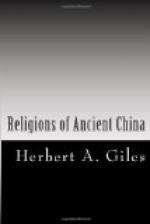Distinction between T’ien and Shang Ti.—The term Shang Ti means literally Supreme Ruler. It is not quite so vague as T’ien, which seems to be more of an abstraction, while Shang Ti is a genuinely personal God. Reference to T’ien is usually associated with fate or destiny, calamities, blessings, prayers for help, etc. The commandments of T’ien are hard to obey; He is compassionate, to be feared, unjust, and cruel. Shang Ti lives in heaven, walks, leaves tracks on the ground, enjoys the sweet savour of sacrifice, approves or disapproves of conduct, deals with rewards and punishments in a more particular way, and comes more actually into touch with the human race.
Thus Shang Ti would be the God who walked in the garden in the cool of the day, the God who smelled the sweet savour of Noah’s sacrifice, and the God who allowed Moses to see His back. T’ien would be the God of Gods of the Psalms, whose mercy endureth for ever; the everlasting God of Isaiah, who fainteth not, neither is weary.
Roman Catholic Dissensions.—These two, in fact, were the very terms favoured by the early Jesuit missionaries to China, though not with the limitations above suggested, as fit the proper renderings for God; and of the two terms the great Manchu Emperor K’ang Hsi chose T’ien. It has been thought that the conversion of China to Christianity under the guiding influence of the Jesuits would soon have become an accomplished fact, but for the ignorant opposition to the use of these terms by the Franciscans and Dominicans, who referred this question, among others, to the Pope. In 1704 Clement XI published a bull declaring that the Chinese equivalent for God was T’ien Chu=Lord of Heaven; and such it has continued to be ever since, so far as the Roman Catholic church is concerned, in spite of the fact that T’ien Chu was a name given at the close of the third century B.C. to one of the Eight Spirits.




